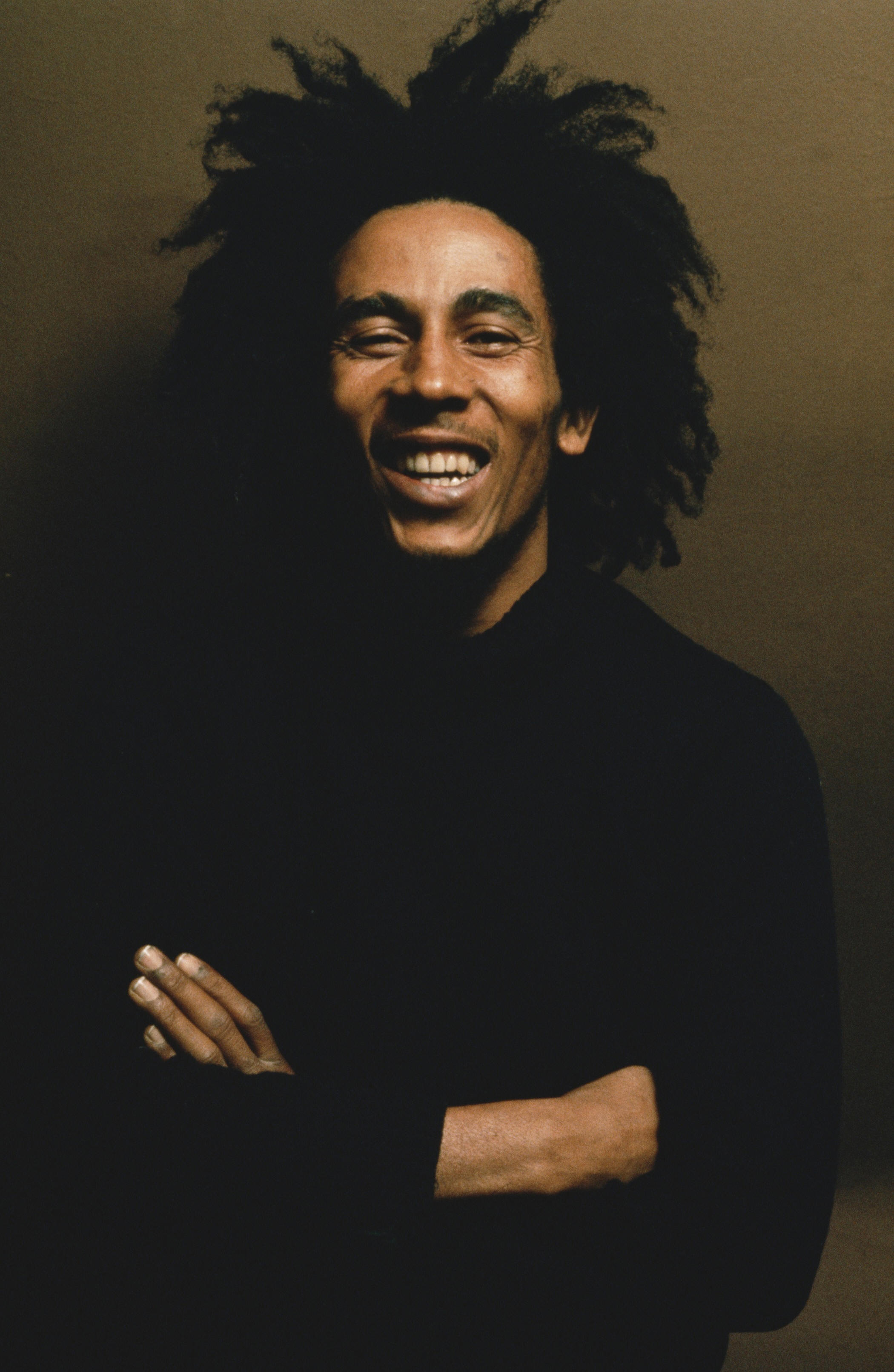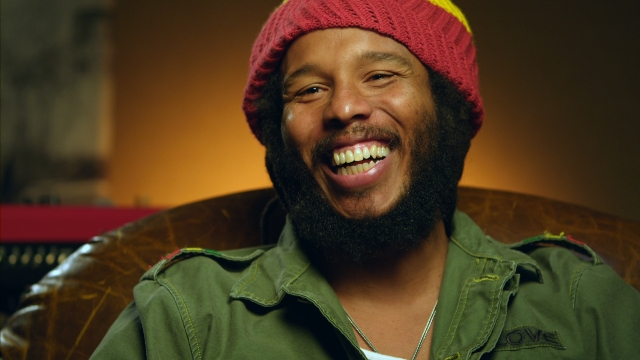MOVIE REVIEWS |
INTERVIEWS |
YOUTUBE |
NEWS
|
EDITORIALS | EVENTS |
AUDIO |
ESSAYS |
ARCHIVES |
CONTACT
|
PHOTOS |
COMING SOON|
EXAMINER.COM FILM ARTICLES
||HOME


Wednesday, April 18, 2012
MOVIE REVIEW
Marley
Prophet Of Peace, Poet Of
Justice, Lover Of The People

Bob Marley.
Courtesy of Magnolia Pictures
by
Omar P.L. Moore/PopcornReel.com
 FOLLOW
FOLLOW
Wednesday,
April 18,
2012
Kevin Macdonald's
"Marley" is a must-see film for Bob Marley fans as well as casual observers.
The epic documentary and biography opens on Friday in several U.S. cities, and
makes history by streaming on Facebook on the musician's page on the same day.
I've long advocated that watching films in a theater is the best possible way to
experience a movie -- and the maximum, kaleidoscopic impact of "Marley" is felt
there -- but the filmmakers recognize that younger people spend more time on
Facebook than in a movie theater, meaning they may more readily watch "Marley"
there perhaps than anywhere else. It's a shrewd move, and the music heard
in the film will be at their instant disposal, merely clicks away on their
computers or anyone else's.
"Marley" is an all-encompassing film. Part-mystery, part-revelation and
all parts fascinating, "Marley" is as much an investigation as a salute to a
deeply spiritual man who touched billions in such a short time and influenced
countless millions. So who was Bob Marley? What was his background?
The Marley family background is the most remarkable yet modest aspect of Mr.
Marley's humble beginnings. Born in Jamaica, he had a father, a white man,
who had not likely ever seen him, and who only ever saw Mr. Marley's mother, a
black woman, once.
Mr. Macdonald's documentary initially looks at the family name Marley as an
ephemeral, elusive one but by film's end the Marley name naturally evolves and
endures as an eternal one. Identity is one of the film's key components.
We are always trying to find out about identity and its positioning as we watch "Marley". "I'm not on the
black man's side. I'm not on the white man's side. I'm on God's
side, because he's the one who made me," or words to that effect spoken by Mr.
Marley. That god may well be Haile Selassie, the emperor of Ethiopia, whom
Mr. Marley worshipped and was fascinated by.
Mr. Macdonald culls together years of great concert footage and interviews
conducted over the decades. They include Mr. Marley, Rita Marley, Bunny
Wailer, Mr. Marley's mother, his son Ziggy and daughter Cedella (both from
Rita), Mr. Marley's girlfriend and 1976 Miss World winner Cindy Breakspeare,
Jimmy Cliff and late reggae legend Desmond Dekker and many others. The
interviews, relaxed, candid and intimate, offer a multifaceted picture of a shy,
serious, devout but playful man whose best and most electric moments were lived
out on stage before the world.
We are treated to anecdotes about Mr. Marley's adherence to Rastafarianism and
educated about the religion and philosophy, which has millions of followers
around the globe. We get a glimpse of a man revealed as a no-nonsense
parent to his children, not letting them have fun even as Mr. Marley was a
charismatic, open-hearted man. We are taught about the origins
of ska and of reggae music, and Mr. Marley's pivotal and symbolic role
in the Jamaican political elections of 1976 between Edward Seaga, a
conservative, and the country's democratic prime minister Michael Manley.
Mr. Manley won re-election that year.

Ziggy Marley during the documentary "Marley",
directed by Kevin Macdonald.
Courtesy of Magnolia Pictures
Not surprisingly Mr. Marley's music forms the centerpiece of "Marley", music
that is well-placed and synched with the various phases of his legendary career,
which began in 1957 with his very first song and ended all-too-briefly and
tragically in 1981, with the singer, poet-musician succumbing to cancer.
"Marley" sometimes sprawls but it always entertains and intrigues. At
times "Marley" is structurally abrupt. Its opening seconds -- a guided
tour on and narrative about the Middle Passage in slavery -- quickly gives way
to a shot of pictures of Mr. Marley and his sound of his music. That theme
is never really explored again in earnest. While some of Mr. Marley's
closest confidants talk about race and openly about Mr. Marley's concern about
not being able to sell out stadia to black audiences (those in the U.S.),
sometimes more substantive discussions about race are abridged.
For example, when Mr. Marley's song "War" is heard -- a song that denounces
racism of any kind, and by further implication the institutional and societal
dominance of whites over blacks, "Marley" quickly veers from an exploration of
such matters (and Mr. Marley's additional thoughts on them), jumping over, if
not co-opting the song's meaning by chronicling the violence that ravaged much
of Jamaica in the late 1970s, particularly around the fierce political divide
between Mr. Seaga's JLP (Jamaica Labour Party) and Mr. Manley's PNP (People's
National Party).
Mr. Marley had a lot on his mind politics and race-wise. His songs ("400
Years", "War", "Zimbabwe", "Redemption Song", "Buffalo Soldier", "Get Up, Stand
Up" and others) on race consciousness, political struggle and universal brother
and sisterhood made that clear, but "Marley" itself regrettably short-circuits
aspects of those themes in Mr. Marley's music. There's an element of
sensationalism in some revelations the interview subjects uncover.
"Marley" nonetheless offers a flavoring of Mr. Marley's roots, family, culture
and reservoirs of feeling and warmth that make him a fully-realized, genuine
heart and not a belated emblem of fashion or trend, even though Mr. Marley lives
on today as a towering talisman for global music, political advocacy and
humanity's oneness.
Mr. Macdonald, who has directed such films as
"The Last King Of
Scotland",
"State Of Play" and last year's documentary
"Life In A Day", captures Bob Marley's life in two and a half hours. He
executes the feat with humor, sobering personal stories and moving episodes,
especially in the film's final half hour. "Marley" is a rich, familial
journey into the making of arguably the 20th century's most globally admired and
greatest figures in music. Mr. Marley was a complex man, passionate about
his love of people around the globe as well as his religion. Peace was his
mantra and justice his advocacy.
Overall, "Marley" is a triumph, and captures the essence of Bob Marley, his
message and meaning.
"Marley" is rated PG-13 by the Motion Picture Association Of
America for drug content, thematic elements and
some violent images. The film contains subtitles from time to time.
The film's running time is two hours and 25 minutes.
COPYRIGHT 2012. POPCORNREEL.COM. ALL RIGHTS RESERVED.  FOLLOW
FOLLOW
MOVIE REVIEWS |
INTERVIEWS |
YOUTUBE |
NEWS
|
EDITORIALS | EVENTS |
AUDIO |
ESSAYS |
ARCHIVES |
CONTACT
| PHOTOS |
COMING SOON|
EXAMINER.COM FILM ARTICLES
||HOME


 FOLLOW
TWEET
FOLLOW
TWEET
 FOLLOW
FOLLOW